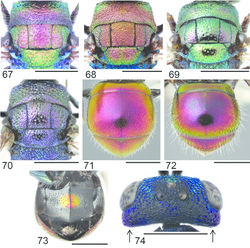Hedychridium cupreum\according to Paukkunen et al 2015
| Notice: | This page is derived from the original publication listed below, whose author(s) should always be credited. Further contributors may edit and improve the content of this page and, consequently, need to be credited as well (see page history). Any assessment of factual correctness requires a careful review of the original article as well as of subsequent contributions.
If you are uncertain whether your planned contribution is correct or not, we suggest that you use the associated discussion page instead of editing the page directly. This page should be cited as follows (rationale):
Citation formats to copy and paste
BibTeX: @article{Paukkunen2015ZooKeys, RIS/ Endnote: TY - JOUR Wikipedia/ Citizendium: <ref name="Paukkunen2015ZooKeys">{{Citation See also the citation download page at the journal. |
Ordo: Hymenoptera
Familia: Chrysididae
Genus: Hedychridium
Name
Hedychridium cupreum (Dahlbom, 1845) – Wikispecies link – Pensoft Profile
- Hedychrum cupreum Dahlbom, 1845: 3.
- Hedychrum integrum Dahlbom, 1854: 86, not (Dahlbom, 1829).
- Hedychridium cupreum: Abeille de Perrin 1879[1]: 39.
Diagnosis
Length 4–5 mm. The species differs from other species of the genus by having very sparse punctation and smooth interstices between punctures on the mesoscutum and mesoscutellum (Fig. 69). The head and mesosoma are dorsally mainly coppery red or greenish (Fig. 69), whereas the metasoma is dorsally red-purple with blue-green reflections. The frons, anterior corners of pronotum, metanotum, propodeum, mesopleuron and tibiae are mainly green or blue. Compared to Hedychridium purpurascens, the metasomal pubescence is longer (Fig. 71) and the scapal basin has broader cross-ridging. S2 does not have a clearly delimited metallic spot medially.
Distribution
Denmark, Estonia, Finland, Latvia, Lithuania, Norway, Sweden. Relatively common. – Trans-Palearctic: from western Europe to Japan, Mongolia and China (Linsenmaier 1959[2], Kurzenko and Lelej 2007[3], Rosa et al. 2014[4]).
Biology
Habitat: sparsely vegetated sandy areas. Adults occasionally visit flowers of Asteraceae and Caryophyllaceae (our own obs.). Flight period: from early June to late August. Host: primarily Dryudella pinguis (Dahlbom) (Else 1973[5], Schmid-Egger et al. 1995[6], Saure et al. 1998[7]), but possibly also Dryudella stigma (Panzer), Harpactus lunatus (Dahlbom) and Harpactus tumidus (Panzer) (Crabronidae) (Trautmann and Trautmann 1919[8], Lefeber 1976[9], Jacobs and Kornmilch 2007[10]).
Taxon Treatment
- Paukkunen, J; Berg, A; Soon, V; Ødegaard, F; Rosa, P; 2015: An illustrated key to the cuckoo wasps (Hymenoptera, Chrysididae) of the Nordic and Baltic countries, with description of a new species ZooKeys, (548): 1-116. doi
Images
|
Other References
- ↑ Abeille de Perrin E (1879) Synopsis critique et synonymique des chrysides de France. Annales de la Société linnéenne de Lyon (n. ser.) 26: 1–108.
- ↑ Linsenmaier W (1959) Revision der Familie Chrysididae (Hymenoptera) mit besonderer Brücksichtigung der europäischen Spezies. Mitteilungen der Schweizerischen Entomologischen Gesellschaft 32: 1–232.
- ↑ Kurzenko N, Lelej A (2007) Chrysididae. In: Lelej A Belokobylskiy S Kasparyan D Kupyanskaya A Proshchalkin M (Eds) Key to the insects of Russian Far East. Vol. IV. Neuropteroidea, Mecoptera, Hymenoptera. Part 5. Dal’nauka, Vladivostok, 998–1006.
- ↑ Rosa P, Wei N, Xu Z (2014) An annotated checklist of the chrysidid wasps (Hymenoptera, Chrysididae) from China. ZooKeys 455: 1–128. doi: 10.3897/zookeys.455.6557
- ↑ Else G (1973) Recent records and notes of Omalus puncticollis (Mocsáry) and other local chrydidid wasps (Hym.) in Hampshire. The Entomologist’s Monthly Magazine 109: 120–122.
- ↑ Schmid-Egger C, Risch S, Niehuis O (1995) Die Wildbienen und Wespen von Rheinland-Pfalz (Hymenoptera, Aculeata) – Verbreitung, Ökologie und Gefährdungssituation. Fauna und Flora in Rheinland-Pfalz, Beiheft 16: 1–296.
- ↑ Saure C, Burger B, Oehlke J (1998) Rote Liste und Artenliste der Gold-, Falten- und Wegwespen des Landes Brandenburg (Hymenoptera: Chrysididae, Vespidae, Pompilidae). Naturschutz und Landschaftspflege in Brandenburg 7 (2 Beilage): 3–23.
- ↑ Trautmann G, Trautmann W (1919) Die Goldwespenfauna Frankens. Zeitschrift für Wissenschaftliche Insektenbiologie 15: 30–36.
- ↑ Lefeber V (1976) Interessante vangsten van Hymenoptera-Aculeata in 1974 en 1975 in Nederland en België. Entomologische Berichten 36: 148–153.
- ↑ Jacobs H, Kornmilch J (2007) Die Goldwespen Mecklenburg-Vorpommerns (Hymenoptera, Chrysididae). Entomologische Nachrichten und Berichte 51: 73–93.
